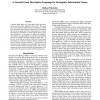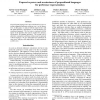674 search results - page 23 / 135 » Preferences in Game Logics |
LPAR
2004
Springer
15 years 5 months ago
2004
Springer
Abstract. We provide uniform and invertible logical rules in a framework of relational hypersequents for the three fundamental t-norm based fuzzy logics i.e., Łukasiewicz logic, G...
AAAI
2010
15 years 1 months ago
2010
A General Game Player is a system that can play previously unknown games given nothing but their rules. The Game Description Language (GDL) has been developed as a highlevel knowl...
IGPL
2002
14 years 11 months ago
2002
The semantics of the independence friendly logic of Hintikka and Sandu is usually defined via a game of imperfect information. We give a definition in terms of a game of perfect i...
KR
2000
Springer
15 years 3 months ago
2000
Springer
Bondarenko et al. have recently proposed an extension of the argumentation-theoretic semantics of admissible and preferred arguments, originally proposed for logic programming onl...
KR
2004
Springer
15 years 5 months ago
2004
Springer
Several logical languages have been considered in AI for encoding compactly preference relations over a set of alternatives. In this paper, we analyze both the expressiveness and ...


